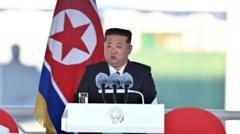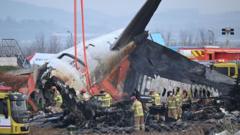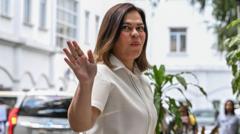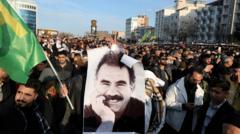Following the impeachment and removal of President Yoon Suk Yeol for an attempted military takeover, South Korea is now set to hold a snap election by June 3. The political landscape remains fraught with division, distrust in institutions, and fears of a return to authoritarianism. Calls for constitutional reform to limit presidential powers have emerged, but the path ahead is unpredictable as the nation grapples with the fallout from Yoon's controversial actions.
South Korea Faces Uncertain Future After President Yoon’s Impeachment
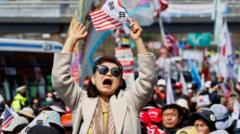
South Korea Faces Uncertain Future After President Yoon’s Impeachment
The ousting of President Yoon Suk Yeol has left South Korea at a critical juncture, as citizens prepare for a snap election amidst heightened political divisions.
South Korea is undergoing significant political upheaval following the Constitutional Court's unanimous decision to uphold the impeachment of President Yoon Suk Yeol. Yoon was suspended during December after his brief attempt to impose martial law, which has now been condemned as an authoritarian power grab. As a result, South Koreans have been left with mixed emotions—while many celebrate the court's verdict as a triumph for democracy, there are tensions underlying the jubilation.
The turmoil began on a tumultuous night in December when Yoon’s military action to quell opposition in parliament was met with widespread backlash from the public and subsequent impeachment proceedings by parliament. Yoon’s actions have been described as a wake-up call to the shadows of South Korea's dictatorial past, reigniting concerns about the fragility of its democracy.
While the ruling has provided clarity, the political climate remains highly polarized with significant calls for reform in presidential powers. Critics describe Yoon’s military measures as not only damaging to democratic principles but also as triggering a resurgence of far-right sentiments among his supporters. His narrative accusing opposition parties of collaborating with foreign adversaries has resonated with a faction of the populace, leading to increased street protests and a growing distrust toward the judiciary and electoral processes.
Looking ahead, South Korea must prepare for a snap election to find a successor by June 3. However, the societal rifts exposed by Yoon’s impeachment suggest a potentially divisive electoral atmosphere. With approximately a third of South Koreans expressing distrust in judicial institutions, the stakes have never been higher for democracy and governance in the nation.
As political leaders urge for unity and acceptance of the court’s decision, the aftermath of Yoon's presidency poses an array of challenges. The newly elected leader will not only have the task of healing divided sentiments but will also face complex international relations, particularly with the United States under President Trump, who has imposed tariffs that threaten South Korea's economy.
Meanwhile, Yoon's legal troubles continue as he awaits trial on corruption charges related to his insurrection. His refusal to concede, combined with calls from his supporters for continued activism, paints a picture of an unresolved political landscape. With historical precedents of political instability in South Korea, the path forward is fraught with uncertainty, compelling citizens and officials alike to navigate these precarious waters with vigilance.


